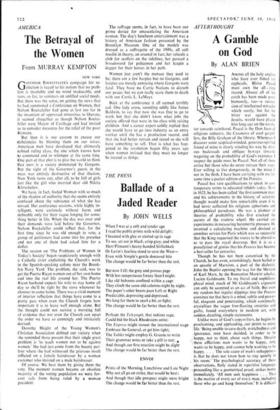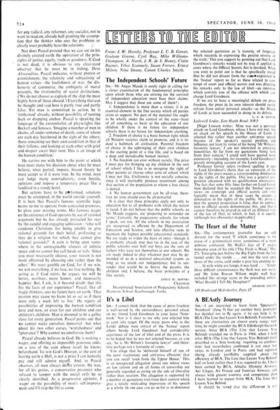AFTERTHOUGHT
A Gamble on God
By ALAN BRIEN
AMONG all the holy anglers who have ever fished for eggheads, Blaise Pascal must own the all - time record. Almost all of his catch has been made post- humously, too—a succes- sion of intellectual miracles which surely, but for his bitter war against the Jesuits, would have placed him long ago on the escala-
tor towards sainthood. Pascal is the Don Juan of religious seducers, the Casanova of cool gospel.
lers, the Billy Graham of the library. Whenever I discover some sceptical-minded, generous-spirited friend of mine is slowly winding his way by devi.
ous backroads and oblique byways towards wagering on the probability of God's existence. I suspect the guide must be Pascal. Not all of them arrive but those who do never retrace their steps.
Ever willing to live dangerously, in the mind if not in the flesh, I have been carrying with me for
some time a pocket edition of the Pensees.
Pascal has rare qualifications to speak in con- temporary terms to educated infidels today. Born in 1623, he has been called 'the first common man' and his achievements in the history of scientific thought would make him remarkable even if he had never collected his religious aphorisms and philosophical paradoxes. He was a pioneer of Theories of probability who first cracked the secrets of the roulette wird. He carried out experiments in measuring barometric pressure. He invented a calculating machine and devised an omnibus service for Paris which was so successful that the King requested the routes to be altered so as to pass the royal doorstep. But it is as a proselytiser of genius that his Pensees has become a best-seller for centuries.
Though he has not been canonised by the Church, he has even, astonishingly, been hailed as an apostle of Marxism, a poet of the dialectic, John the Baptist opening the way for the Messiah of Karl Marx, by the Rumanian Marxist scholar, Lucien Goldmann. To my literal and unphiloso- phical mind, much of Mr Goldrnann's argument can only be accepted as an act of faith. But even my random but regular dippings into the Pensees convince me that here is a mind, subtle and power- ful, eloquent and penetrating, which continually crystallises the vague free-floating anxieties and guilts, found everywhere in modern art, with sudden, dazzling, simple statements.
Unlike most of God's copywriters, he begins by proclaiming, and applauding, our desire to enjoy life. 'Being unable to cure death, wretchedness and ignorance, men have decided, in order to be happy, not to think about such things. Despite t these afflictions man wants to be happy, only wants to be happy, and cannot help wanting to be happy. . . . The sole cause of man's unhappiness is that he does not know how to stay quietly in . his room.' The psychological accuracy of these observations, flatly stated in repetitive language. proceedirig like a geometrical proof, strikes home immediately. 'All men seek happiness . . . That is the motive of every act of every man, including those who go and hang themselves.' It is difficult
for any radical, any reformer, any socialist, not to want to read on, already half granting the assump- tion that the thinker who sees the problenis so clearly must probably have the solutions.
Nor does Pascal pretend that we can see on his divinely created earth the operation of the prin- ciples of justice, equity, truth or goodness. If God is not dead, it is obvious to any clear-eyed observer that he must be in hiding, Deus A bsconditus. Pascal indicates, without protest or astonishment, the relativity and subjectivity of human values—the foolishness of war, the dis- honesty of commerce, the ambiguity of moral precepts, the irrationality of social distinctions. ('We do not choose as captain of the ship the most highly born of those aboard.') Everything that can be thought and said here is partly true and partly false. Yet man is committed to action, he is 'embarked' already, without possibility of turning back or dropping anchor. Pascal is speaking the language of the existentialist, of playwrights like Beckett and Ionesco. 'Imagine a number of men in chains, all under sentence of death, some of whom are each day butchered in the sight of the others; those remaining see their own condition in that of their fellows, and looking at each other with grief and despair await their turn. This is an image of the human condition.'
He carries me with him to the point at which man must make his decision about what he' must believe, what partial, impure, biased theory he must accept as if it were true. In the mind, man can lodge many contradictory, even hostile, opinions and impose a temporary peace like a landlord in a rowdy hotel.
But actions have to be performed, solutions must be attempted, in the world outside yourself. It is here that Pascal's famous scientific logic seems to me to operate from concealed premises, to gloss over missing terms. His famous wager on the existence of God operates by use of rational argument but he has already protected his rear by the candid and engaging admission—'who will condemn Christians for being unable to give rational grounds for their belief, professing as they do a religion for which they cannot give rational grounds?' A coin is being spun some- where in the unimaginable silences of infinite space and we cannot but call heads or tails. 'Since you must necessarily choose, your reason is not more affronted by choosing one rather than the other.' We must gamble on God, for if we win, we win everything, if we lose, we lose nothing. By acting as if God exists, he argues, we will be better, worthier, more honest, and necessarily happier. But, I ask, is it beyond doubt that this fits the facts of our experience? Pascal, like all tragic thinkers, sees no future here on earth. 'That passion may cause no harm let us act as if there were only a week left to live.' He rejects all possibilities of improving the human condition here and now, or even for our children and our children's children. Man is doomed to be a galley slave for every generation. Pascal points out that we cannot make ourselves immortal—but what about his two other curses, 'wretchedness' and 'ignorance'? Why cannot we ameliorate them?
Pascal already believes in God. He is making a wager, and offering us impossibly generous odds, on a toss of the coin whose result he knows beforehand. To win God's Heaven, at the cost of leaving earth a Hell, is not a price I can honestly pay and still admire myself. And, as Pascal observes, all men always degtre esteem. He was, for all his genius, a conservative pessimist who refused to tamper with the social evils he so clearly identified. As a progressive optimist, I wager on the possibility of man's self-improve- ment and I'll skip the life to come.



































 Previous page
Previous page